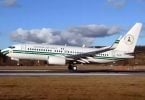The transition from Fastjet’s Airbus A319 fleet to a leaner and more cost-effective fleet of Embraer E190s appears to have hit regulatory snags in both Tanzania and Zimbabwe.
Information filtering in suggests that in Tanzania, the airline presently operates one of the two remaining A319s 5H-FJD and one of initially 3 Embraers secured on a wet lease from Air Bulgaria. FJD also appears to be heading for some major maintenance soon for engine overhauls, leaving little room to maneuver for the airline’s management in Dar es Salaam.
Earlier, information released spoke of the airline announcing operational changes to its schedule until the end of October, and the situation would be monitored if a full schedule will resume thereafter or if operational restrictions would remain.
Weeks ago, the regulators were playing hardball with Fastjet in Tanzania over the introduction of its Embraer E190 aircraft. One of the reasons given was that the AOC, short for air operator certificate, only shows the A319 as the aircraft of choice, which according to a Tanzania Civil Aviation Authority (TCAA) source would require an amendment first. Said another source close to the TCAA on condition of anonymity: “Some goodwill was extended to Fastjet when the first E190 under wet lease was given operating permission. But this is Tanzania, and the ongoing revival of Air Tanzania must not be overlooked. Of course … that [does] influence the thinking in the higher echelons of the TCAA, and Fastjet’s problems will help Air Tanzania to get a foot back in the door of the domestic market. That was until now tied up between Fastjet and Precision, so you can see this was a gift for ATCL to take advantage of.”
It is understood that Fastjet is fast tracking the acquisition on a dry lease of suitable aircraft but must meet regulatory conditions first to have their AOC amended, the aircraft type approved by the TCAA – the Embraer E190 has previously not been operated in Tanzania – and have their aircraft manuals, maintenance and training provisions updated and sanctioned.
It has also been suggested that operational challenges on the double daily route to Mbeya have emerged, as fuel there is super expensive, if at all available, compelling the airline to fly the E190 with less than a full house in order to uplift more fuel for the return flight. This is a very costly situation which in fact some time ago compelled Precision Air to drop the route after authorities failed to ensure a regular affordable fuel supply in Mbeya.
Flights to and from Johannesburg, by the look of it, also seem to be operated by another aircraft to keep the schedule on this hugely important route intact.
A similar situation appears to have unfolded in Zimbabwe, where authorities are equally un-keen to sanction a wet lease of an Embraer, again in part because the AOC for Fastjet specifies the use of an A319. That aircraft will, therefore, by the look of it, remain on the fleet for the time being before an aircraft change can be approved by the Zimbabwe Civil Aviation Authority (ZCAA). The ongoing revival of Air Zimbabwe no doubt plays a role, perhaps in a covert way more than an overt way, but this is aviation “Realpolitik” in the truest sense.
All the best-laid plans on how to save costs and introduce leaner aircraft types appear to have been brought to a grinding halt by regulators, and it will take Nico Bezuidenhout and his team a Herculean effort to resolve such challenges on the double to avoid a further loss of market share.
Long term, the airline of course has a bright future, once the fleet renewal and relocation of the head office from London Gatwick to Johannesburg has been accomplished, but in the short run, some form or crisis management will be the order of the day. This, however, is something Nico is used to from his two spells as Acting CEO of South African Airways. There, his input and reform program has been paying dividends of late, giving the same hope to Fastjet to fly out of the present turbulences sooner or later.








Leave a Comment